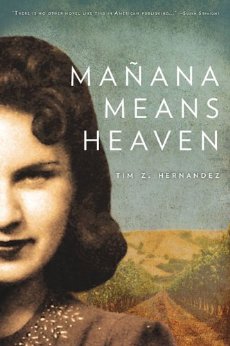Excerpt from the forthcoming novel Mañana Means Heaven:

Wednesday, October 22, 1947
The workers couldn’t stop talking about it. Especially that whole first day after it happened. According to the paper, a “wetback” was found strung up in a sycamore tree near Raisin City. From his neck dangled a cardboard sign:
PARASITE
The Fresno County Coroner confirmed that because nowhere on the body were there bruises or scrapes the only logical explanation was suicide. A common occurrence among braceros. Naturally. They missed their families back home. Depression was inevitable. Fear was constant. The food too bland. A bottle of whiskey was found half emptied nearby. And for Xixto María Martínez, all the signs were there. On this very day his contract was up. As for the brief poem found on his person, the paper offered no explanation, except to say: Mr. Martínez had a way with words. It was imminent now. Xixto dying the way he died was only a suggestion.
The workers knew this, and thought hard about it as they bent over their vines that morning in a solemn daze. The fields were gray with dew, and each grape wore a thin veil of film so that its sheen was hidden. So quiet were the rows and the shuffling of feet that swallowtails perched themselves on the branches of the vines and plucked the smaller tart grapes at will. And as if things weren’t bad enough, a cold snap was creeping in over Devil’s Ridge from the north and settling down into the valley, sure to cripple whatever bits of fruit were still unharvested.
That morning, Bea’s hands moved faster than anybody else’s. Box after box was filled and carted off to be weighed and counted, and within seconds she was right back where she’d left off, on the very same tendril, making sure the job was done right and that every last grape was accounted for. She passed other workers as if they were standing still, and for the most part they were. It seemed everyone was busy scratching their heads, worried whether today was the day it would all go down.
They eyed Jack suspiciously, wondering if the rumors were true. A lechuza they called him. A white owl in their midst. For the most part he got good at ignoring their accusatory glares. But off and on he’d feel something, a pebble, smash against his neck. He shrugged it off and kept his hands moving. Meanwhile, Bea kept saying the words,New York, in her mind. And while her feet were sunk firm in the wet soil, the rest of her may as well have been in a subway, barreling down the spine of Manhattan, a purse slung over her shoulder and both kids clinging to her arms. She thought about what her brother had said. “Five days,” she mumbled to herself, “just five more little days.” She passed the time picturing their new life, imagining the big smell of New York City, and watching the kids monkey around the playground of some brick schoolyard tucked between high-rise buildings. She lifted another box of grapes and hauled them off to be counted.
Meanwhile, Jack trailed one row back, cutting away viciously with his curved knife all the knots and tendrils that cradled the grapes deep in their clutches. His gaze was stern and removed, and his pink face glowed in the cold. Little Albert nipped at his heels, raking out whatever clusters went overlooked and plopping them down into Jack’s box like the handy assistant that he was. Each time he did this he looked to Jack for approval, or a smile, anything to erase the worrisome look on his face. Jack watched the way the boy handled his knife and shot around the whole field effortlessly, offering a hand here and there, calling out to the other workers in Spanish, whistling the whole way. He was a little man doing big man’s work, and Jack had taken notice that the fields had an army of these little men workers, boys, whose small hands were crucial to the whole operation. Every last one of them wore a defeated mask. And if you looked at them from a distance, he reasoned, you’d think they were full-grown men by the way they stood, hips squared and shoulders back. The only way you could tell the boys apart from the adults was at lunchtime, when they’d all gather around a hole in the dirt to shoot marbles.
Jack observed this and shook his head, remembering a line from one of the great scribes of this territory, William Saroyan, who said it best about such children of the valley: I was a little afraid of him; not the boy himself, but of what he seemed to be, the victim of the world.
© 2013 Tim Z. Hernandez. Reprinted by permission of the University of Arizona Press.
Based on the life and love of Bea Franco and Jack Kerouac, as well as Hernandez’s interviews with Franco, the real woman behind Kerouac’s story “The Mexican Girl,” Mañana Means Heaven is available August 29.
Tim Z. Hernandez is the author of the novel Breathing, In Dust, as well as three collections of poetry.



